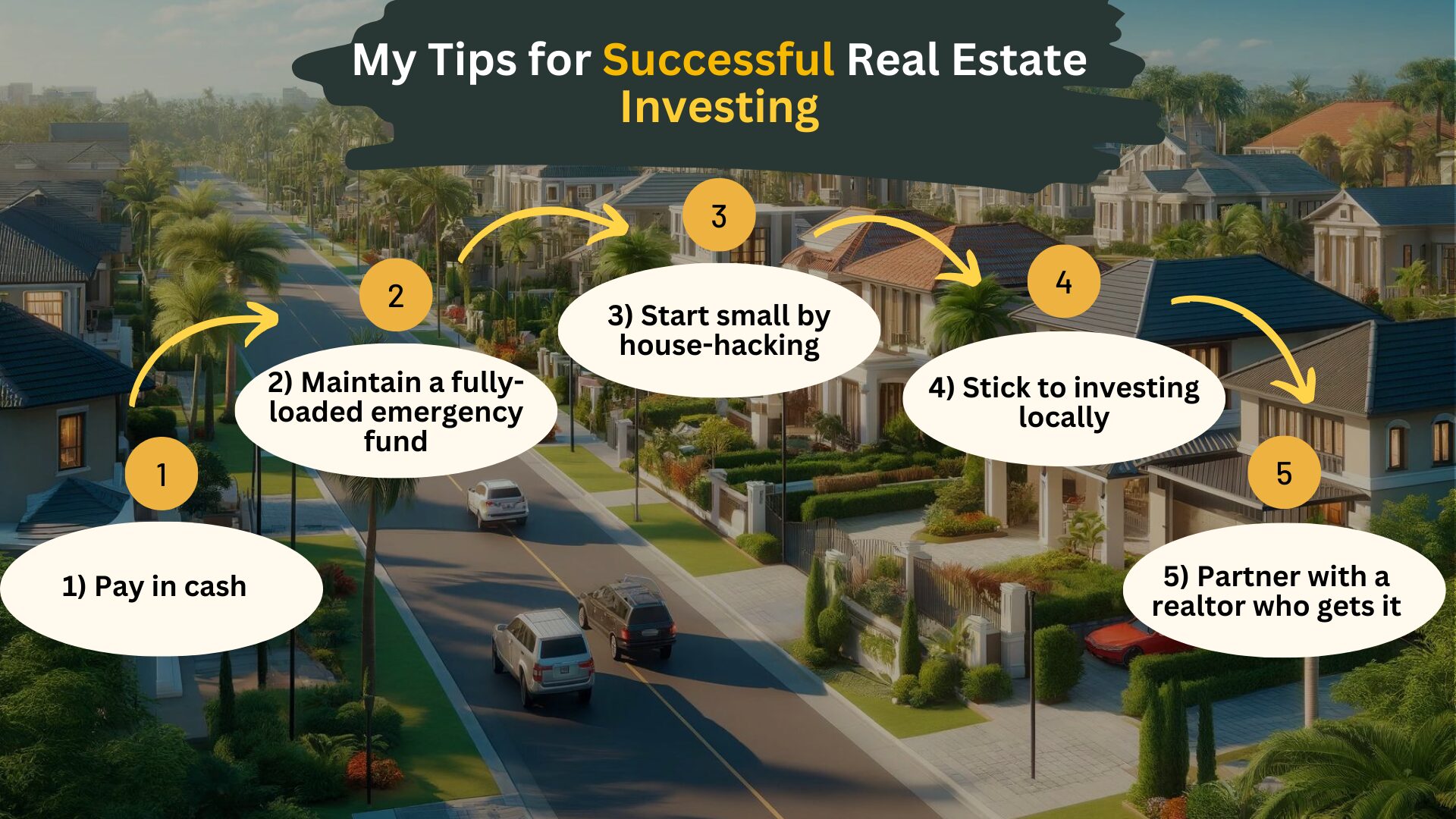Let’s be real here – you’ve probably seen plenty of people on social media bragging about how investing in real estate has been a total game-changer for their finances. And you know what? They’re not lying. A solid real estate investment strategy can seriously boost your net worth and provide a nice extra income stream. But here’s the catch that a lot of those influencers conveniently leave out…
Investing in real estate is usually a total grind. We’re talking blood, sweat, and tears kind of work. It’s definitely not as chill as just kicking back in your recliner and waiting for the money to roll in each month. Whether you’re a landlord managing rental properties, a house-flipper doing renos left and right, or simply a homeowner working hard to pay off your mortgage, real estate investing demands a huge amount of your time, cash, and effort.
Don’t get me wrong, I’m not trying to discourage you from investing in real estate. In fact, I’m a big advocate for it when it’s done right. But you gotta be patient and put in the hard work upfront. This ain’t no get-rich-quick scheme or passive income dream. It takes perseverance and hustle.
Still on board? Awesome, then let’s dig into how to really invest in real estate properly. We’ll cover the main strategies and answer those burning questions like “How the heck do I even get started?” and “Is real estate actually a solid investment?”
The 4 Key Ways to Invest in Real Estate
Investing in real estate doesn’t just mean one thing. There are actually several different paths you can take, each with their own pros and cons:
1. Purchase a home and fully pay off the mortgage
You might not think of it this way, but purchasing your own home that you live in and grinding away at the mortgage is an investment in itself. Homeownership forces you to sock away cash over time as you build equity. Not to mention, the longer you own, the more the property value will likely climb, giving your net worth a nice boost.
But here’s the real kicker – once you finally make that last mortgage payment and own your home outright, you never have to stress about losing the roof over your head again (as long as you stay on top of property taxes and insurance, of course). No lenders can come knocking. You can just ride out any market ups and downs like a boss.
Plus, once you’re mortgage-free, just imagine how much you could invest each month towards other goals with the money you’ll have freed up! That’s why step one is focusing on paying down your home loan before getting into any other real estate investments.
If you’re currently renting and looking to take the homeownership plunge for the first time, start knocking out any other debts and stashing away a 3-6 month emergency fund. Then start saving up for a nice downpayment of at least 5-10% of the purchase price (or 20% if you want to avoid paying mortgage insurance).
Click here to learn more and subscribe to the newsletter
2. Become a Landlord with Rental Properties
Alright, once you’ve crushed your mortgage and wiped out other debts, that’s when you can start considering taking the plunge into buying rental properties to bring in some side income each month. If you play your cards right and buy smart, those properties could make you thousands per year. And if you decide to sell down the road after the value has gone up, you could pocket a tasty profit too.
Here’s the catch though – you should ONLY buy a rental property if you’ve got a fully-loaded emergency fund (again, 3-6 months’ worth of expenses) and if you can pay the full purchase price in cash. Taking out a loan for an investment property is just way too risky.
Listen, being a landlord has plenty of potential upsides, but it’s far from passive income. You’ve got to be prepared to deal with tenants who trash the place, skip out on rent, or move out leaving you with extended vacancies. When something breaks, you’re the one who has to handle it. Like when the toilet decides to go haywire at 2am, you’re the one getting that delightful call and doing the walk of shame to fix it, not some property manager.
If you pay in cash though, at least you can more easily absorb those little financial hits without falling behind on payments if there are repair issues or gaps between tenants. But if you’re making mortgage payments on top of everything else, your finances could take a major beating.

3. Flip Houses Not into the idea of being a landlord?
Another option is flipping houses. This involves buying a property, making some renovations and upgrades, then reselling it for a profit relatively quickly, usually within a year or so. The key here is buying smartly at a discount, since you likely won’t make a decent profit unless you get the property for a steal upfront.
House flipping can be appealing because you can potentially make a nice lump sum profit without the long-term commitments of being a landlord. But make no mistake – it’s far from easy money. Renovations always seem to cost more and take longer than expected. You also run the risk of buying a total lemon of a property or getting stuck having to sell during a down market.
That’s why, just like with rental properties, you should only flip houses if you have a robust emergency fund and can pay cash for the purchase and renovations. When you remove debt from the equation, the risks become much more manageable. Being handy yourself also helps to control costs, otherwise you’ll need to hire and oversee contractors.
4. Invest in a REIT
The final way to invest in real estate is through a real estate investment trust (REIT). This is basically a mutual fund that owns different properties and passes the income on to you as the investor. Some REITs are publicly traded, while others are private.
REITs allow you to invest in real estate without having to actually buy and manage properties yourself. But they come with some important caveats – you should only invest in REITs after you’re 100% debt-free (including having your home fully paid off) and you’ve maxed out tax-advantaged retirement accounts like 401ks and IRAs.
You’ll also want to thoroughly vet any REIT’s performance history and management team, as some are definitely better investments than others. And most advisors recommend limiting your REIT allocation to no more than 5-10% of your overall investment portfolio to limit risk.
So those are the four primary ways to invest in real estate. Each path has its own set of potential upsides and downsides to carefully consider. The kroz is putting in the research and making smart, informed decisions – don’t just blindly follow what some talking head is pushing on social media. As always, having a solid financial foundation with no debt is critical before heading down any of these roads.
Get your free guide “Passive Real Estate Investing For Busy Professionals”
The Real Pros and Cons of Real Estate
Investing in real estate definitely isn’t all sunshine and roses though. Before going all-in, you need to carefully weigh the pros and cons:
Pros
– An extra income stream (duh!) – This is the main draw for things like rental properties or flipping houses.
– Your net worth grows – As your properties increase in value over time, so does your net worth on paper.
– Tax benefits – Real estate investors can take advantage of things like deducting operating expenses, mortgage interest, and depreciation. Free money from the IRS is always nice!
Cons
– It requires hard work – Don’t buy into the hype that real estate investing is passive income. Managing properties or flipping houses takes serious time and energy.
– There are risks – What if home prices dip in your area? What if you get bad tenants or costly repairs? You have to be prepared for those risks.
– No guaranteed returns – While investing in real estate can build wealth over time, there’s no promise you’ll make money, especially in the short-term. If home values tank temporarily or you struggle to find tenants, you could lose out.
My Tips for Successful Real Estate Investing
If you’re seriously considering getting into rental properties or home flipping, here are my top tips for making it work:

1) Pay in cash – Taking out loans for investment properties just puts you at way more risk. When you pay in cash, you can easily absorb hiccups like vacancies or repairs without falling behind on payments. Plus, you get to keep all the profits for yourself rather than paying interest!
2) Maintain a fully-loaded emergency fund – This is critical for landlords. Even if your property is occupied, appliances will still break and need replacing eventually. Not to mention, you have to be able to cover the mortgage if you can’t find a tenant for awhile. Make sure you’ve got enough set aside to cover those costs.
3) Start small by house-hacking – Not sure if landlording is for you? Try just renting out a spare room or basement suite in your current home before going all-in on a separate rental property. It’ll give you a taste of what dealing with tenants is really like.
4) Stick to investing locally – Don’t buy a rental property across the country. You’ll have no way to properly oversee the place and will likely get ripped off by a property manager. Keep things close to home so you can easily keep an eye on your investment.
5) Partner with a realtor who gets it – Work with an experienced local real estate agent who can guide you through neighborhoods, pricing, and all the unique quirks of being a real estate investor in your area. Trust me, their expertise will be invaluable and can save you from making costly mistakes.
At the end of the day, real estate investing isn’t a magic solution for getting rich quickly without lifting a finger. It takes serious effort and planning upfront. But if you’re willing to put in the work and play it smart, it can absolutely allow you to build wealth over time. Just don’t believe every video you see promising millions with zero effort – that’s all hype.
Conclusion
In the end, real estate investing requires a significant commitment of time, money, and effort upfront. The four main strategies – paying off your home, buying rentals, flipping houses, and investing in REITs – all come with potential rewards but also major risks and responsibilities.
Before considering any of these paths, you need an extremely solid financial foundation with no debts, a robust emergency fund, and maxed retirement accounts. Only then can you prudently take on things like being a landlord or flipper.
The keys are managing risk by avoiding debt, doing extensive research, and having a patient, realistic mindset. Real estate investing is not a get-rich-quick scheme. But with discipline and hard work, it can provide additional income streams and increase your net worth over many years as part of a comprehensive wealth-building plan.
Interested in multifamily real estate investing? Our experienced team is here to help. From market research to identifying the best opportunities, we guide you through the process. Subscribe to our YouTube channel for informative videos and expert discussions, and follow us on Instagram for exclusive content. Explore our comprehensive Udemy course for detailed insights and strategies. Ready to elevate your investment journey? Contact us now to schedule a consultation and achieve your financial goals in real estate.
*This content is for informational purposes only and is not intended as financial or legal advice. Please consult with a professional advisor before making any investment decisions.




























